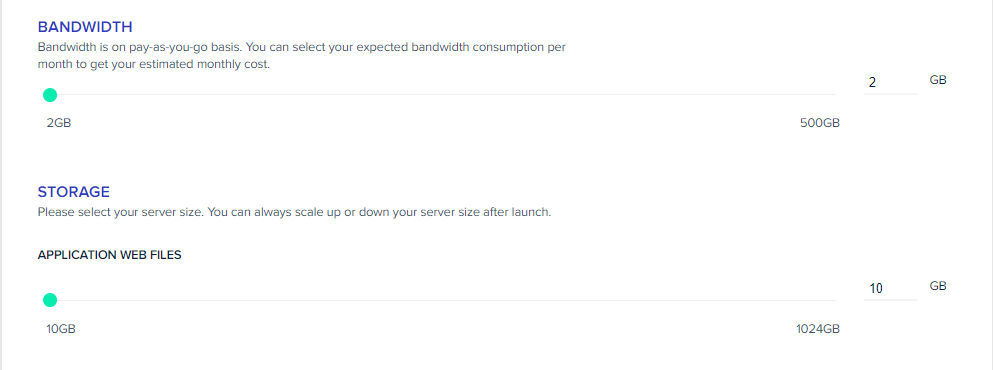Today in the modern business world, when companies are weighing in to cut down costs and maximize efficiency, people are searching for more effective ways to manage their hosting requirements. That is why, technological advancements have led to newer inventions, and today PHP Amazon cloud hosting has become the need of the hour.
Advantages of Cloud Hosting
Cloud hosting is highly accessible and offers an unprecedented level of scalability beyond the capabilities of traditional hosting.
It comes with very affordable infrastructure and facilitates easy app migration and installation plans. The efficiency of cloud hosting is unmatchable, as it is responsible for housing, running, and maintenance of all the necessary hardware itself. This allows clients to consequently pay for the resources they use, similar to paying for utility bills.
Host Your PHP Apps With Us For 10x Faster Performance
Don’t Let Your Customers Run Away With The Downtimes. Deploy With Us Today!DEPLOY NOW
When it comes to security of web apps, PHP AWS hosting is much better than the traditional web servers with PHP and MySQL support, and provides more organized security layers. It does this through customer identity management, storage segregation, data isolation, firewalls, backup recoveries and encrypted solutions. The backup feature also provides disaster recovery, to help users restore their data in the wake of any accidental failure.
Why Should I Host My Website on AWS
Amazon Elastic Compute Cloud (Amazon EC2) is the core component of Amazon Web Services. It allows users to rent virtual computers to run web applications as a virtual private server. These virtual private servers are almost similar in functionality to dedicated physical servers.
Here are the three main benefits of deploying PHP application on Amazon EC2, highlighting the fact as to why businesses are rapidly moving towards Amazon’s virtual server hosting platform:
Complete Control with Ease of Access
Users have complete administrative control over their virtual servers (also known as compute instances) by hosting a website on AWS EC2. Essentially, PHP MySQL AWS hosting provides the same level of access and control as a physical server operated locally in the office.
Users can efficiently manage many web features through the Amazon EC2 web interface which allows users to scale up or down, boot and configure processor settings with just a few clicks.
Freedom to Select a Platform of Your Choice
When you launch an application on an EC2 instance, you get the authority to run an operating system of your choice. Users can select from multiple Linux distributions, or they can run Microsoft Windows server.
This is an important feature for most businesses, especially for those considering making a switch to the cloud. If a company has used Windows Server for years and has developed apps and databases within the Windows Server framework, they shouldn’t have to reprogram their IT infrastructure in the cloud to run on a different platform. As users can select the operating system of their choice, migrating your website on EC2 platform is quite easy.
Secure
EC2 has multiple built-in security features. When you launch an application on EC2, its deployment is on a technically isolated virtual private cloud network. Users have complete control to authorize who want to access their apps on the cloud.
Amazon EC2 has security groups that act as virtual firewalls to control traffic to one or multiple applications. Users can establish rules for each security group, and can modify them at any time. If a company decides to keep some processes running on premise, and they want to connect their virtual private clouds to physical hardware on-site, they can establish a seamless connection through a hardware VPN device.
Steps Needed to Install PHP AWS EC2
- Launch a PHP AWS EC2
- Choosing the OS and hardware
- Editing some basic configurations
- Creating a key pair
- Locking the key file
- Connecting to Instance
- Installing Apache
- Installing MySql
- Installing PHP with common extensions
- Installing phpMyAdmin
- Allowing Mysql Root Login through phpMyAdmin
- Connecting Instance with FTP client
Managed Cloud Hosting! Cloudways
PHP is a versatile server-side scripting language which you, being a developer, can use for other use cases as well. Using PHP, you can develop amazing web applications in flexible, modular form. With PHP, you also get handy dependencies manager that provides you multiple access methodologies for relational databases and utilities.
Not every cloud hosting infrastructure provider can deliver exceptional performance for PHP based applications. Hosting PHP on Amazon Web Hosting Services is common among the most experienced PHP developers.
However, not everyone tends to show interest in the technical aspects of web applications, and just wants to quickly deploy a fully capable and easy-to-install PHP application. It is interesting to note that having a managed PHP AWS hosting provider not only takes away your web hosting hassles, but also enables you to focus on building advanced web apps.
In this context, Cloudways PHP AWS hosting platform is the ultimate solution for designers, agencies and developers. It saves your time and resources, giving you best PHP deployment tools and ample time to focus on developing cutting-edge web apps – and runs your online business effortlessly on highly advanced PHP MySQL AWS hosting servers.
To set up a server directly on PHP MySQL AWS hosting, requires a decent bit of server-side technical knowledge. Therefore in this article, I will demonstrate you how easy it is to host PHP website on AWS using Cloudways.
You must follow the steps mentioned below to deploy PHP with Amazon in quick time:
- Launch Server
- Select PHP 7 and AWS EC2
- Select Cloud Provider
- Select Server Size, Bandwidth, Storage
- Select Server Location
How to Host a Dynamic PHP Website on AWS EC2
To host Amazon with PHP app, the first step is to sign up for a Cloudways Account.
Step 1: Launch Server
To add a server, first click on ‘Add Server’ button on the top right corner.

Step 2: Select PHP 7 and AWS EC2
Now, launch your desired application (PHP 7.0) on your preferred cloud server. You can choose from AWS, Digital Ocean , Linode and Vultr. For this tutorial, select AWS.

Step 3: Select Server Size, Bandwidth, Storage
Now, it’s time to scale and select resources. Use the slider to scale up or down to set up server size, bandwidth and storage for your server.

Bandwidth

Database

Step 4: Select Server Location
Now, you must select the region in which you wish to host the server. Then, click on ‘Launch Server’ button to begin installing PHP on AWS EC2 server.

Trackback 1